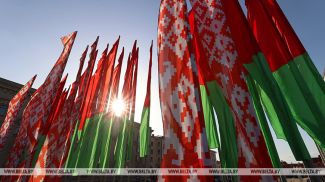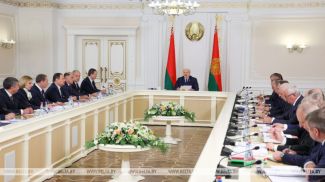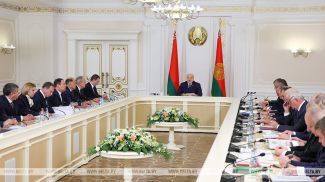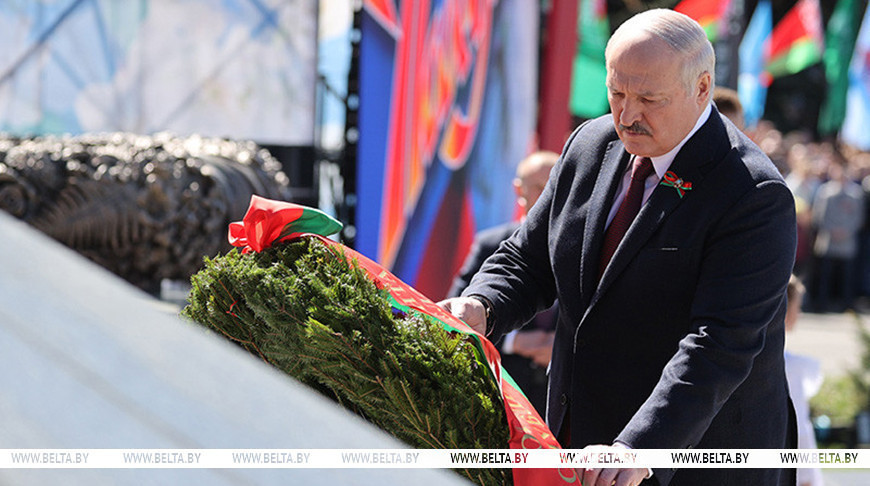
During these May days, when we remember our common victory - the Victory of the Soviet people in the Great Patriotic War, we would like to recall the words of the Belarusian president: “The more time passes from the heroic and tragic events, the more we venerate the sacrificial feat of our grandfathers and great grandfathers, those, who saved the mankind from enslavement and extermination.” But let's figure out why the more time passes, the stronger is our desire to stand up for truth and justice, and the more fiercely the West holds onto global dominance. Why the farther we are from those events, the more careful we are of our historical memory and the more barbaric our neighbors are towards war monuments. The war crimes have no statute of limitations, do they? We discuss this in a new episode of BelTA’s Youtube project “After the Fact: Lukashenko’s Decisions”.
What was the war for Belarusians?
Some chided Belarus for its over-focus on the war commemoration as if no important events happened ever since. To be honest, until recently, some of us teased the older generation over their "anything but war" mantra and the traditional wishes for a peaceful sky. It turned out that it was a mistake. Big mistake.
The great Russian commander Alexander Suvorov is credited with the following words: “The war is not over until the last soldier is buried!" He is believed to have said them after the defeat of the Turkish army at the Battle of Rymnik. Russia lost a couple of hundred people in that battle…
Now let's get back to our history. In April 2021, the General Prosecutor's Office launched a criminal case into the genocide of the population of Belarus during the Great Patriotic War and the post-war period. the German invaders and their accomplices killed more than three million Belarusians. Almost 400,000 people were taken to Germany for slave labor. More than 12,000 villages were completely or partially destroyed. Several hundred of them shared the sad fate of Khatyn. More than 580 death camps were established on the territory of our country, and almost 200 major punitive operations were carried out.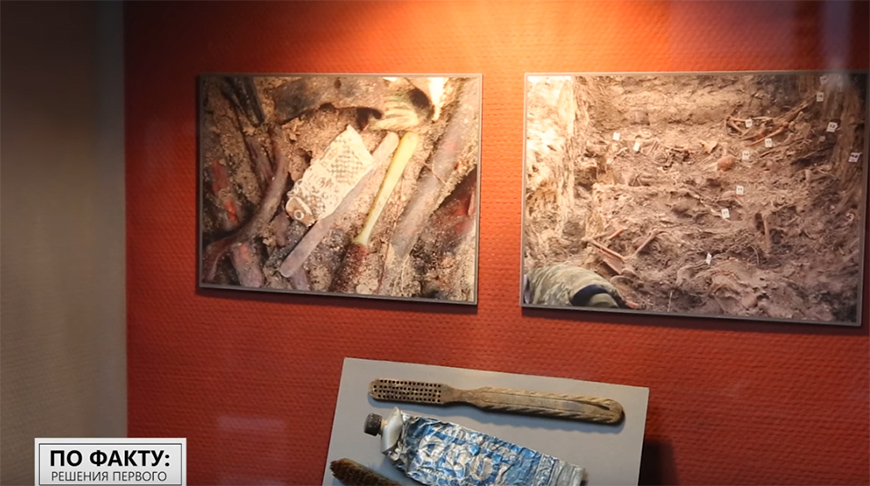 "The investigation of the criminal case into the genocide of the Belarusian people continues. For a little more than three years of the investigation, we obtained the information confirming that the scale of the tragedy during the Great Patriotic War is much greater than previously thought. One of the goals of the investigation is to establish all the facts of the genocide that took place on the territory of our country during the Great Patriotic War. But the most important goal is to bring to justice all Nazi criminals who committed atrocities against the Belarusian people. We are moving towards this goal. As part of the criminal case we have put together a list of henchmen and their accomplices that will soon be persecuted by the Prosecutor General of Belarus,” said Sergei Shikunets, Deputy Head of the Department for Supervision over the Investigation of Particularly Important Criminal Cases of the Prosecutor General's Office.
"The investigation of the criminal case into the genocide of the Belarusian people continues. For a little more than three years of the investigation, we obtained the information confirming that the scale of the tragedy during the Great Patriotic War is much greater than previously thought. One of the goals of the investigation is to establish all the facts of the genocide that took place on the territory of our country during the Great Patriotic War. But the most important goal is to bring to justice all Nazi criminals who committed atrocities against the Belarusian people. We are moving towards this goal. As part of the criminal case we have put together a list of henchmen and their accomplices that will soon be persecuted by the Prosecutor General of Belarus,” said Sergei Shikunets, Deputy Head of the Department for Supervision over the Investigation of Particularly Important Criminal Cases of the Prosecutor General's Office.
If we apply Suvorov's words to our realities, will the war ever end for Belarusians?
This is why the memory of those who died in the fight for the freedom and independence of our Motherland, for the liberation of the planet from Nazism, the memory of the victims of Nazism is sacred for our people. This has become part of the national idea.
“Recently we hear more people say: ‘What do we need this for. Let us forget everything’. A hideous thing hides behind these seemingly harmless words. It is an attempt not only to forget but also rewrite the history of the war, take away the feat of our people. We must not forget it. We must not give Great Victory away. It is a testimony of the greatness of the Soviet people whose descendants we are,” Belarusian President Aleksandr Lukashenko said at a ceremony to unveil the Trostenets Memorial in 2015.
Approaches by Belarus and its neighbors to honoring the past
Let's compare. In 2020, the Ola memorial was opened in Svetlogorsk District on the site of the village destroyed during the war. Almost 2,000 people were burned here, more than half of them were children. That's twelve Khatyns! In the same year, a monument to the burned villages was dedicated in Mogilev Oblast.
Two years ago, the Khatyn memorial complex was declared an all-Belarusian construction site. Student teams from all over Belarus worked here. The project was financed from the budget and also with the money earned during the national cleanup day. All in all, about Br5 million was spent on the renovation of the memorial. Roughly speaking, it was $1.5-2 million. In 2023, more than 500,000 people visited Khatyn, which was almost twice as many as in previous years. Such a flow of tourists was associated with the opening of a unique museum here.
At the same time, Latvia was busy too: the Riga City Council proposed to demolish the monument to the Liberators of Riga. This idea was supported by the president of the country. The city authorities bulldozed the flowers laid at the memorial, opened criminal and administrative cases against the protesters, promised to expel from the country all foreigners who joined the protesters... It came to the point of absurd: they decided to drain the pond near the monument and feed the fish to animals in Riga Zoo. The dismantling of the memorial in honor of Soviet soldiers cost €2 million. It turned out that this was just the beginning: the Latvian government had prepared a list of 69 Soviet war memorials to be demolished.
Latvia’s actions were not unique for Europe. Poland has been implementing its decommunization law since 2017. The dismantling of Soviet monuments and memorials in honor of the liberators has become almost a national idea in Estonia and Lithuania. Ukraine has eagerly joined this dance on the bones.
It became almost a matter of honor for Kiev to replace the Soviet emblem on Europe’s highest monument with the Ukrainian trident coat of arms. The project to ‘decommunize’ the Ukrainian Motherland monument cost about $500,000. This is not about money (although it could have been used to address more pressing problems in Ukraine). The question is whether such “rebranding” made Ukraine greater. After all Kiev, Minsk, Moscow, and other capitals of the post-Soviet republics survived thanks to those whom these monuments commemorate!
“Today you and I wonder about the same thing: could the heroes of the war have imagined that 80 years later their children and grandchildren would have to fight for the truth about the Great Victory, for the right to honor the victorious warriors on this holy day? Today we should openly speak about the fact that during the Great Patriotic War Belarusian civilian population was subjected to a massive and systemic extermination. We will never forget that millions of our compatriots fell on battlefields, perished in death camps, were hanged, shot or tortured to death by gestapo. We remember it and if someone forgets it, we will remind them,” the Belarusian president said in 2021.
Whom does the memory of the victims and heroes of the war give hard time today?
“The memory of the victims of the war, the heroism of our fathers and grandfathers gives a hard time to some people, first of all, to the ideological followers of murderers and traitors. It is they who honor the executioners in their parliaments today. It was they who started the war against graves and monuments in Poland, the Baltic states and Ukraine. Complete madmen! Do they think that by destroying a monument they will destroy the memory that lives in the hearts of the people? The people who found the strength to build new peaceful relations with those states that only yesterday brought suffering and death to our lands,” Aleksandr Lukashenko said as he attended a ceremony together with Russian President Vladimir Putin to unveil the memorial to the USSR civilians who fell victim of Nazi genocide during Great Patriotic War in January 2024.


Why does this great monument bear importance for our peoples? After all, there are thousands of war monuments in Russia and Belarus. Everything is simple. The overwhelming majority of them honor the heroes - Red Army soldiers and partisans, the people who defended their land with weapons in their hands. It is as important to pay tribute to the people who could not defend themselves.
“The Prosecutor General's Office of Belarus nominated Brest Fortress for inclusion in the UNESCO World Heritage List as a memorial symbolizing the fight against Nazism, the fight against the policy of genocide throughout the world. The Prosecutor General's Office also suggested awarding the international status of historical and cultural heritage to the Trostenets concentration camp, which was the largest one in terms of the number of people killed there. Large-scale work is conducted to set up expositions dedicated to the genocide of the Belarusian people in all corners of our country. Together with the Education Ministry we have prepared supplements about the genocide of the Belarusian people to the history textbooks,” representative of the General Prosecutor's Office Sergei Shikunets said.

“As long as we come to the monuments, we will not go to war”
Again we may ask a rhetorical question: why our European neighbors are deeply preoccupied with demolishing Soviet memorials? Why do Belarus and Russia try their best to perpetuate the memory of that terrible tragedy? A common tragedy for all our peoples.
During that ceremony Aleksandr Lukashenko reminded us of a simple truth: we cannot change the past, but it is in our power to protect the future. For this, we should cherish our common historical memory, the brotherhood of peoples and the unbreakable unity of the nations that fought against the world evil and defeated it. At a time when some forces prefer to forget the terrible pages of the Second World War, try to shift the accents in terms of responsibility of some countries, Belarus stands guards of the true history. Not only in stone. Back in October 2004 Aleksandr Lukashenko signed a decree to establish a new insignia - a pennant ‘For valor and perseverance during the Great Patriotic War’. It was awarded to 36 settlements of Belarus. Each of these places became a true citadel of fortitude, where both soldiers and local residents showed incredible bravery.
“As long as we build monuments, as long as we come to the monuments, we will not go to war, we will avoid such terrible tragedies. As soon as we forget the way to these holy places, a war will certainly follow,” the Belarusian leader warned.
Is it possible to forgive the Nazis’ crimes?
Thanks to search operations, many horrifying facts have been uncovered and new evidence of terrible crimes has been discovered over the past three years.
“The German fascist invaders and their accomplices spared no one: either children, or the elderly, or women. In this exhibit we see fragments of shoes found at the excavation site in Ivanovshchina Forest in Logoisk District, Minsk Oblast. In that pit of about 80 meters in diameter we found bone remains belonging to at least 1,021 people. The most horrifying thing is that we found skeletal remains of children and women. We had to remove the bone remains with our own hands. It was really hard to do this emotionally because we understood we were touching history. It was hard to imagine what happened in that place 80 years ago: people waiting for their death near the pit. People were brought to the edge of the pit, forced to their knees and shot dead. Those who were wounded were simply buried alive,” Sergei Shikunets said.
Thousands of concentration camp prisoners have shared their memories. Their stories leave no one indifferent. We would like to tell you about the fate of one girl - Emilia Kopytok. She, a 10-year-old red-haired girl then, called Squirrel by her loving parents, went through six concentration camps. And she survived! The child saw baths with human fat from which soap was made, saw little children and their mothers brutally murdered. Is it possible to forgive such things? Is it possible to forget?
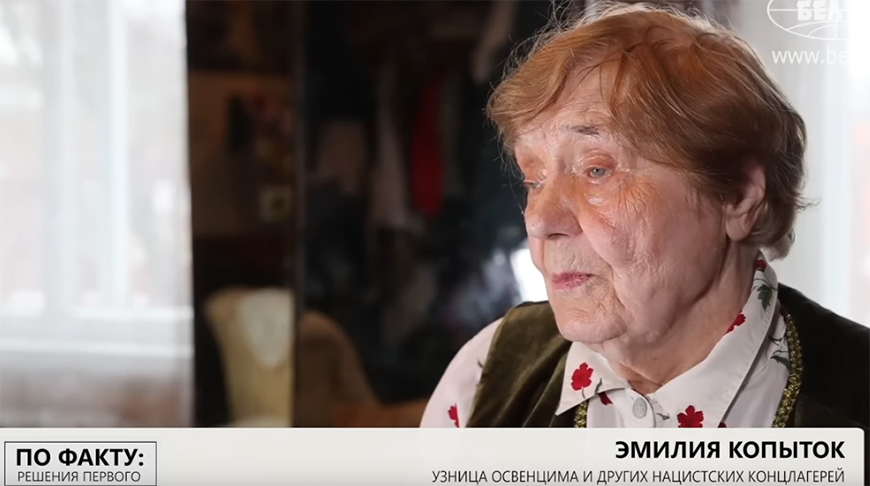
“When we were allowed to get off carriages, I saw a forest, German guards and German shepherd dogs. And a huge bonfire. Nearby there was another train full of Jews. The Jews were also getting off train, and mothers were carrying small children in their arms. They were all very pretty and curly-haired. These children were grabbed and thrown into the bonfire. The mothers who ran after their children screaming were bayoneted and thrown into the fire too. There was terrible screaming, terrible howling, terrible crying, terrible barking of dogs. The bonfire was burning like a candle,” Emilia Kopytok said.
Belarusians are a strong nation. Strong because they never forget. Strong because they are ready to forgive. But is it really a time to forgive?





